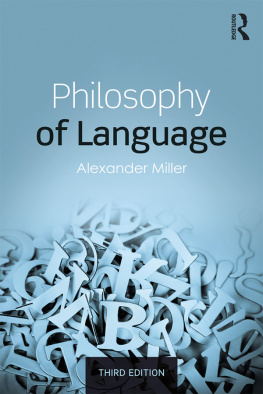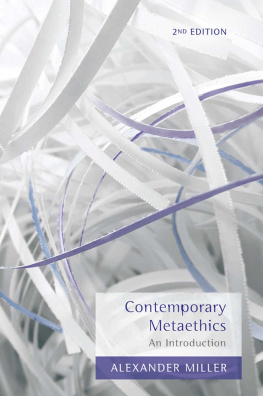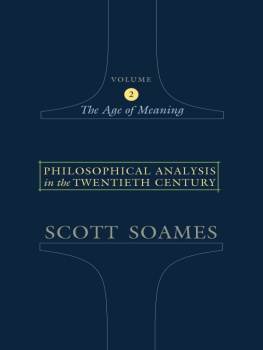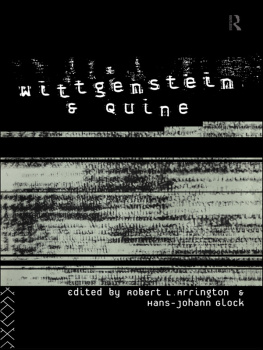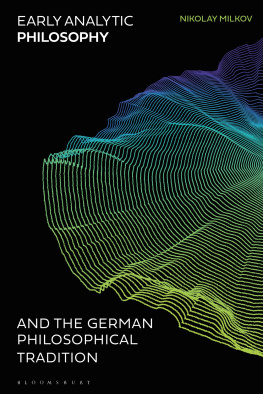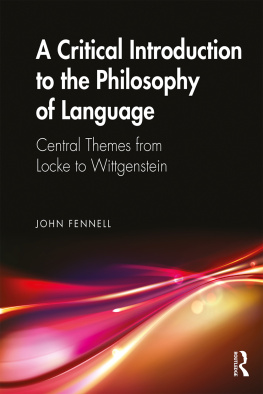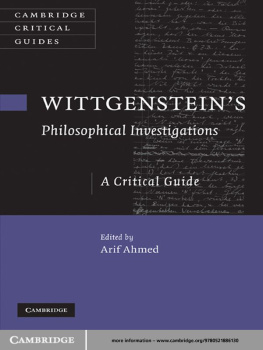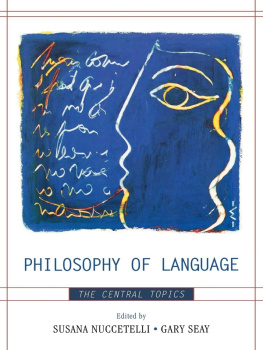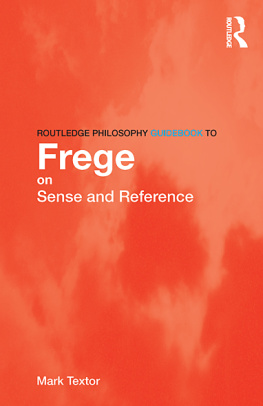
p.i
Philosophy of Language
Philosophy of Language provides a comprehensive, meticulous survey of twentieth-century and contemporary philosophical theories of meaning. Interweaving the historical development of the subject with a thematic overview of the different approaches to meaning, the book provides students with the tools necessary to understand contemporary analytic philosophy. Beginning with a systematic look at Freges foundational theories on sense and reference, Alexander Miller goes on to offer a clear exposition of the development of subsequent arguments in the philosophy of language. Communicating a sense of active philosophical debate, the author confronts the views of the early theorists, taking in Frege, Russell, and logical positivism and going on to discuss the scepticism of Quine, Kripke, and Wittgenstein. The work of philosophers such as Davidson, Dummett, Searle, Fodor, McGinn, Wright, Grice, and Tarski is also examined in depth.
The third edition has been fully revised for enhanced clarity and includes:
a short introduction for students, outlining the importance of the philosophy of language and the aims of the book;
two substantial new sections on Philip Pettits ethocentric account of rule-following and on Hannah Ginsborgs partial reductionism about rule-following and meaning;
the addition of chapter summaries and study questions throughout, designed to promote greater understanding and engagement;
updated guides to further reading at the end of every chapter.
This well-established and sophisticated introduction to the philosophy of language is an unrivalled guide to one of the liveliest and most challenging areas of philosophy and is suitable for use on undergraduate degrees and in postgraduate study.
Alexander Miller is Professor of Philosophy at the University of Otago, New Zealand. He is author of Contemporary Metaethics: An Introduction (Polity Press, second edition, 2013), co-editor of Rule-Following and Meaning (Acumen, 2002) and co-editor of A Companion to the Philosophy of Language (second edition, Wiley-Blackwell, 2017).
p.iii
Philosophy of Language
Third Edition
Alexander Miller

p.iv
Third edition published 2018
by Routledge
2 Park Square, Milton Park, Abingdon, Oxon, OX14 4RN
and by Routledge
711 Third Avenue, New York, NY 10017
Routledge is an imprint of the Taylor & Francis Group, an informa business
2018 Alexander Miller
The right of Alexander Miller to be identified as author of this work has been asserted by him in accordance with sections 77 and 78 of the Copyright, Designs and Patents Act 1988.
All rights reserved. No part of this book may be reprinted or reproduced or utilised in any form or by any electronic, mechanical, or other means, now known or hereafter invented, including photocopying and recording, or in any information storage or retrieval system, without permission in writing from the publishers.
Trademark notice : Product or corporate names may be trademarks or registered trademarks, and are used only for identification and explanation without intent to infringe.
First edition published by Routledge 1998
Second edition published by Routledge 2007
British Library Cataloguing-in-Publication Data
A catalogue record for this book is available from the British Library
Library of Congress Cataloging-in-Publication Data
Names: Miller, Alexander, 1965- author.
Title: Philosophy of language / Alexander Miller.
Description: Third edition. | New York : Routledge, 2018. | Includes bibliographical references and index.
Identifiers: LCCN 2017033619| ISBN 9780415718950 (hardback : alk. paper) | ISBN 9780415718974 (pbk. : alk. paper) | ISBN 9781351265522 (e-book)
Subjects: LCSH: Language and languages--Philosophy. | Meaning (Philosophy)
Classification: LCC P107 .M547 2018 | DDC 401dc23
LC record available at https://lccn.loc.gov/2017033619
ISBN: 978-0-415-71895-0 (hbk)
ISBN: 978-0-415-71897-4 (pbk)
ISBN: 978-1-351-26552-2 (ebk)
Typeset in Century Schoolbook and Futura
by Swales & Willis Ltd, Exeter, Devon, UK
p.xi
To the student, philosophy of language can seem a bewilderingly diverse and complex subject. This is not an illusion, since philosophy of language deals with some of the most profound and difficult topics in any area of philosophy. But beneath the diversity and complexity, there is some unity. In this book I have concentrated on exhibiting this unity, in the hope that it might make some of the more profound and difficult questions a little more approachable to the student. I have adopted an approach which is broadly thematic, but also (up to a point) historical. If there are two main themes in twentieth-century philosophy of language, they could perhaps be termed systematicity and scepticism . Ordinarily, we would say that speakers of a language understand the expressions of that language, or know their meanings . Philosophers have been motivated by a desire to say something systematic about these notions of linguistic understanding, meaning, and knowledge. One way in which this can be done is to give some informal theory of meaning : this is a theory which attempts to analyse and elucidate our ordinary, pre-theoretic notion of meaning. In , the relevance of questions about meaning to issues in metaphysics. I try to provide a rough map of the current debate between realism and anti-realism, displaying the relevance to this debate of the issues discussed in the previous chapters.
p.xii
Obviously, in a book of this length, many important topics in the philosophy of language have had to be ignored, and the discussion of chosen topics has sometimes had to be drawn to a premature close. I hope, though, that although the map provided in this book is incomplete, it is detailed enough to allow the student undertaking further study to work out where these other topics should be located, and to continue the discussion from where I have left off. Guides to further reading are provided at the end of each chapter. Likewise, it is my hope that teachers of the philosophy of language will be able to use this book in their courses, filling out the map as they go along, according to their own interests in the philosophy of language.
p.xiii
The book has been written to be accessible to second- or third-year undergraduate students, or to anyone with a basic knowledge of the language of elementary logic, such as that taught in first-year university courses. Some knowledge of elementary general philosophy, such as that taught in first-year courses on metaphysics and epistemology, would be useful, though, I hope, not essential. Some parts of the book are more demanding than others. For readers entirely new to the philosophy of language, 3.3, 5.35.5, 6.36.9, and 8.5 could be left out on a first reading, and returned to later. Postgraduates and more advanced undergraduates should note, though, that in many ways 6.36.9 constitute the heart of the book. It is my hope that these sections, and indeed the rest of the book, may also be of use to professional philosophers with an interest in the philosophy of language.
ALEXANDER MILLER
Birmingham March 1997
Note
Ive altered the section numbers here to take account of the new third edition sections AM (June 2017).
p.xiv
In this second edition I have added several new sections, cleaned up the original text considerably, and updated the guides to further reading at the end of each chapter. The presentation of Kripkes Wittgenstein, in particular, has been modified to take into account the complexities brought to light by the factualist interpretation pioneered by George Wilson and David Davies (although in the end I argue against the factualist interpretation in 5.7). Since the preparation of the first edition, three excellent resources for the philosophy of language have been published: A Companion to Philosophy of Language (Oxford: Blackwell 1997), edited by Bob Hale and Crispin Wright, The Blackwell Guide to the Philosophy of Language (Oxford: Blackwell 2006), edited by Michael Devitt and Richard Hanley, and A Handbook of Philosophy of Language (Oxford: Oxford University Press 2006), edited by Ernest LePore and Barry C. Smith. I mention a few of the constituent articles in these volumes in the Further reading and in the footnotes, but Id like to take this opportunity to recommend them generally: they are the essential next port-of-call following the present text for all serious students and researchers in the philosophical study of language.
Next page
